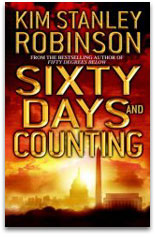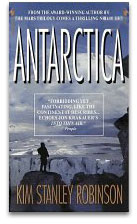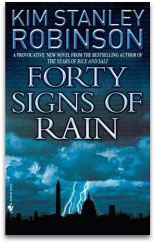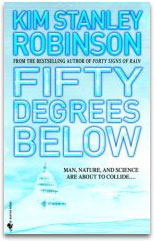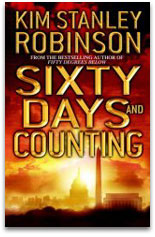
Sixty Days and Counting,
by Kim Stanley Robinson.
I waited for the release of Kim Stanley Robinson’s new book, Sixty Days and Counting, like a computer geek awaiting the release of the PS3: standing outside the door of the store, in the snow, having cleared my calendar for a few days so I could dive right in.
I’m a fan of Robinson’s voluminous work because environmental themes usually animate the characters and move the plot. The “Three Californias” trilogy presented “future histories” with different environmental, technical, and social scenarios, while the Hugo- and Nebula-award-winning “Mars” trilogy traced that planet’s transformation from science station to corporate colony to autonomous world. Antarctica explored the possible impacts of climate change and eco-terrorism while examining various modes of interacting with the harsh landscape.
Sixty Days and Counting is the final book in the “Capitol Code” trilogy, whose characters are experiencing and trying to mitigate the impacts of climate change in the near future. Charlie Quibler works part-time from home as an environmental policy advisor to Senator Phil Chase while caring for his feisty toddler, Joe, and school-aged Nick. Anna Quibler runs the bioinformatics division at the National Science Foundation, where she works with Frank Vanderwal, a scientist’s scientist on loan to NSF from his faculty post at the University of California San Diego.
In Forty Signs of Rain, the first book in the trilogy, Anna befriends four Tibetan refugees who move into office space at NSF. Having fled Chinese human-rights abuses, the Tibetans found quasi-autonomy on the island of Khembalung, but it is threatened by climate change-induced rising sea levels. The Tibetans have come to D.C. to lobby for social and environmental justice.
Senator Chase brushes off the Tibetans and dismantles Charlie’s omnibus environmental bill, while Frank becomes disenchanted by NSF’s inability to act on any of the obvious climate-protection strategies suggested by scientific research. The possibility of meaningful action emerges when Katrina-style flooding hits D.C. In Fifty Degrees Below, the sense of urgency is enhanced when fresh water dumped into the north Atlantic from the thawing Arctic ice cap causes the Gulf Stream to fail. During the ensuing brutal winter, the National Science Foundation moves forward with aggressive research and mitigation steps, including restarting the Gulf Stream’s thermohaline cycle. (“Putting salt in the ocean,” one of the Tibetans quips ironically. “Good idea.”)
Sixty Days and Counting picks up the story as Senator Chase is elected president. His inaugural address sounds like Al Gore on steroids reading a Kucinich script: “For the sake of climate stabilization, there must be population stabilization; and for there to be population stabilization, justice must prevail.”
Throughout the series, Robinson seamlessly weaves science, politics, and spirituality into a compelling story whose characters practically come to life. While reading, I heard a guest on NPR’s Talk of the Nation Science Friday contend that climate change is too expensive to address. I desperately wanted to call in and quote Frank Vanderwal: “Say it cost a trillion dollars to install clean-energy generators and change out the transport fleet. Weigh that against the financial benefit to civilization of continuing with approximately the [same] sea level, the weather, the biosphere support, etc.; also the difficult-to calculate-in-dollars but undoubtedly huge benefit of avoiding a great deal of human suffering … Two trillion dollars would not be more than three or four years of the Pentagon’s budget … [we] could shift to clean power and transport so cheaply relative to the total economy.” I rarely feel compelled to cite fictional characters on radio call-in shows, but Robinson’s writing always gets under my skin this way.
Robinson also manages to actually dramatize sustainable living: the Quiblers in an egalitarian and somewhat nontraditional nuclear family in a suburban home (for now), Frank as a neo-Paleolithic freegan, the Tibetans in community. He even captures mundane moments in the life of an enviro-geek: “Back in his office, therefore, Frank would sit at his desk, staring at his list of Things To Do … Ordinarily the list would be enough to distract anyone. Its length and difficulty made it all by itself a kind of blow to the head. It induced an awe so great that it resembled apathy … And as more disasters blasted into the world, their Things To Do list would lengthen.”
In his essay “Imagining Abrupt Climate Change: Terraforming Earth,” Robinson indicates that he sees the series as comic, in that “the discrepancy between what we say and what we do, what we intend and what we achieve, is always partly comic.” Sixty Days and Counting isn’t quite a comedy of manners, which my old handbook of literature insists “depicts daily life without coming to grips with questions of good and evil.” Perhaps it’s a new genre — a comedy of catastrophe that recognizes that how we live our daily lives does bring us to grips with questions of good and evil. And without adding any spoilers, I can say that Sixty Days does satisfyingly end as Robinson predicted in his essay: “with the traditional comic ending — dancing, singing, marriage, children all happy.”
